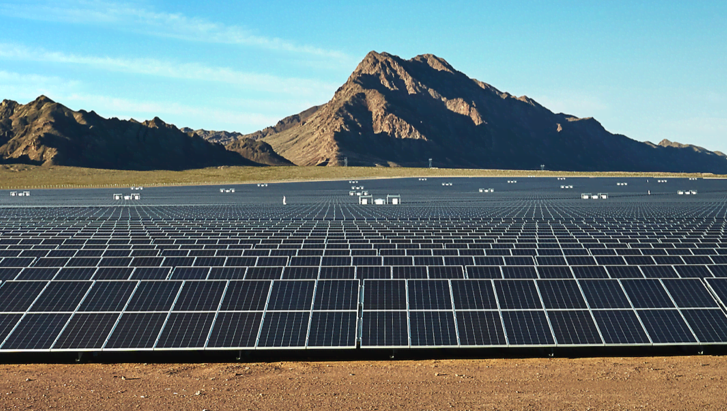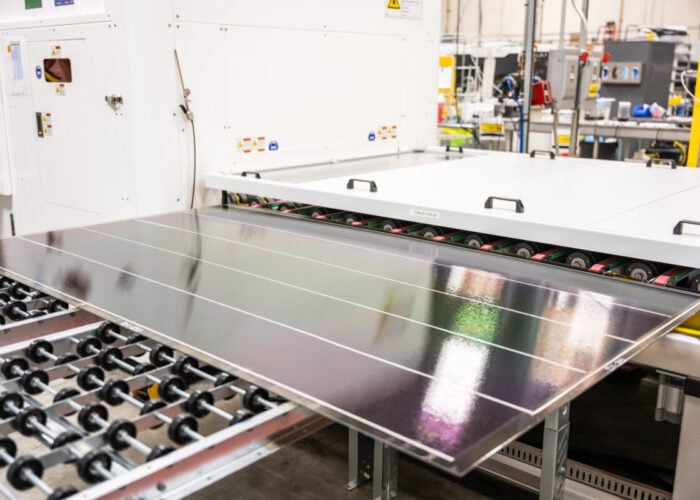
This week, module manufacturers around the world have announced new manufacturing facilities, and new records for their modules, as companies look to expand their footprint and influence amid growing interest in the global solar sector.
In China, Trina Solar has started commercial production at a 10GW facility; in India, Ampin Energy Transition and Jupiter International have made plans to build a 1.3GW module manufacturing plant; and in France, Risen Energy has received a commendation for minimising the carbon footprint of producing its hetereojunction (HJT) Hyper-ion module.
Unlock unlimited access for 12 whole months of distinctive global analysis
Photovoltaics International is now included.
- Regular insight and analysis of the industry’s biggest developments
- In-depth interviews with the industry’s leading figures
- Unlimited digital access to the PV Tech Power journal catalogue
- Unlimited digital access to the Photovoltaics International journal catalogue
- Access to more than 1,000 technical papers
- Discounts on Solar Media’s portfolio of events, in-person and virtual
Trina Solar facility begins production
Chinese module manufacturer Trina Solar has started commercial production at its 10GW facility in Jiangsu province, with its n-type industrial tunnel oxide passivated contact (i-TOPCon) Vertex N 610W module and an n-type TOPCon module now produced on a commercial scale.
The company began production of a larger scale of the Vertex N module earlier this year, and its commitment to manufacturing a range of products demonstrates its interest in supplying cells and modules for a range of uses. For instance, in September, Trina Solar announced that it had supplied TOPCon modules to a power station in China.
Trina Solar expects facilities such as this to contribute to a significant expansion of its module manufacturing capacity, targeting an annual output of 50GW of modules, and 95GW of cells, by the end of this year. The company is on track to meet this target, having sold 27GW of modules in the first half of the year, and expects to produce 40GW of n-type cells in particular by the end of 2023.
Ampin and Jupiter to build Indian factory
Indian power companies Ampin Energy Transition and Jupiter have entered into a “strategic partnership” to build a 1.3GW cell and module manufacturing facility in India. While the companies have not yet announced the details of their joint venture, or the location of its new manufacturing facility, Jupiter already operates an 800MW cell manufacturing plant in Himachal Pradesh, and the companies’ leaders will be keen to take advantage of this expertise in the sector.
“This move will help us achieve backward integration and enhance our control over the supply chain for crucial components, which would help us optimise our operations for quality, efficiency and cost-effectiveness,” said Pinaki Bhattacharyya, Ampin CEO. “There is a strong demand for Indian solar modules and with the right support and policies, they will become cost effective and competitive globally.”
The project will benefit from a production linked incentive scheme announced earlier this year by the Indian government. The state plans to invest INR240 million (around US$2.8 billion) to fund 48GW of new solar manufacturing capacity by 2026, as the government aims to increase total manufacturing capacity to 100GW by this year.
The news follows the government’s request for selection for 1GW of new solar projects, made earlier this month, as India looks to dramatically expand its solar capacity and decarbonise its energy mix.
Risen’s Hyper-ion module granted approval by Certisolis
Certisolis, an institution appointed by the French Energy Regulatory Commission (CRE), has completed its assessment of Risen’s Hyper-ion HJT module, and found that production of the panel does not involve a significant carbon footprint cost.
The group found that building a panel produces 376.5 kilograms of carbon dioxide equivalent per kilowatt of electricity (kg eq CO2/kWp), well below the 550kg eq CO2/kWp upper limit. Panels that produce less carbon dioxide than this limit are eligible to be used in projects submitted for CRE tenders, and the approval of Risen’s latest module creates a significant opportunity for the company to expand its portfolio into France.
“In an era where the global impact of climate change is ever-increasing, carbon neutrality has become a universal imperative,” said Liu Yafeng, senior director of research and development at Risen Energy. “It testifies to our commitment to advancing PV technology and our ambition to empower the world to accelerate towards a zero carbon future with innovative products.”
The news follows strong financial results for Risen, which posted revenues of US$2.43 billion in the first half of this year. However, the news may be greeted with caution by some in the European solar industry, where an influx of low-price modules from China has all but priced European manufacturers out of the panel production market. The potential for Risen, a Chinese company, to become more closely involved in the French solar sector will do little to alleviate these concerns.







